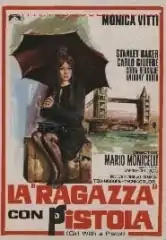The Girl with the Pistol
The Girl with the Pistol (Italian: La ragazza con la pistola) is a 1968 Italian comedy film directed by Mario Monicelli.[1] It was nominated for the Academy Award for Best Foreign Language Film. Monica Vitti won the David di Donatello as Best Actress.
| La ragazza con la pistola | |
|---|---|
 | |
| Directed by | Mario Monicelli |
| Produced by | Gianni Hecht Lucari |
| Written by | Luigi Magni Rodolfo Sonego |
| Music by | Peppino De Luca |
| Cinematography | Carlo Di Palma |
| Edited by | Ruggero Mastroianni |
| Distributed by | Documento Film |
Release date |
|
Running time | 100 minutes |
| Country | Italy |
| Language | Italian |
The film tackled the themes of bride kidnapping and honor killing, which were still relevant in the Southern-Italian culture of the time and normalized to some extent by Italian law, and had then only recently been challenged when Franca Viola publicly refused to marry the man who raped her.
Plot
In a small village in Sicily, the young woman Assunta falls in love with Vincenzo, who serenades under the window of the house where she lives with her sisters.
One day, Assunta is walking down the street with her sisters when two men on a car cut them off, and a passer-by warns them they are attempting bride kidnapping.
Sensing the men are sent by Vincenzo to kidnap her, Assunta throws herself into their car, but when she finally meets him, Vincenzo explains he was actually trying to kidnap her sister Concetta. Since he refuses to marry her and flees to United Kingdom to avoid arrest, Assunta has no choice but heading back to her village.
According to the local traditions, she and her sisters are unable to marry, unless someone in the family kills the offender and restores the honor of the family. For this reason she leaves for United Kingdom too. She is intimidated by the different culture at first, but resolutely travels to Edinburgh, Sheffield and Bath in search of Vincenzo, in order to kill him.
When in Bath, she recognizes Vincenzo as a porter of the local hospital. She follows him, but accidentally assists to an operation and faints. When hospitalized, she meets another patient, Frank, understanding and sentimental , who advises her to forget about Vincenzo, and to devote herself to her life. After Vincenzo simulates his death and leaves the town, Assunta gets engaged to Frank. However, Dr Osborne, the physician who treated both Frank and Assunta in the hospital, feels obliged to tell her that Frank is, in fact, a homosexual. Hence she gives up the marriage, and starts a new life as a single in London.
In the meantime, Vincenzo becomes more and more disappointed with British women and is aware of the fact that he cannot return to Italy again, so he manages to contact Assunta. Her first reaction is to try to kill him again, but he explains he means to marry her, on condition that she gives up her freedom. The next day, however, she takes a boat to join Dr Osborne, while Vincenzo watches her leaving and judges her as an "easy girl".
Cast
- Monica Vitti as Assunta Patanè
- Stanley Baker as Dr. Osborne
- Carlo Giuffrè as Vincenzo Macaluso
- Corin Redgrave as Frank Hogan
- Anthony Booth as John
- Aldo Puglisi as Sicilian immigrant
- Tiberio Murgia as Sicilian immigrant
- Dominic Allan as Mr. Sullivan
- Deborah Stanford as Mrs. Sullivan
- Catherine Feller as Rosina Canunzio
- Helen Downing as Ada
- Janet Brandes as Nurse
- Natasha Harwood as Mrs. Osbourne
- Stefano Satta Flores as Servant at Capri restaurant
- Johnny Briggs as Cad at dance (uncredited)
References
- "The 41st Academy Awards (1969) Nominees and Winners". oscars.org. Retrieved 2011-11-15.